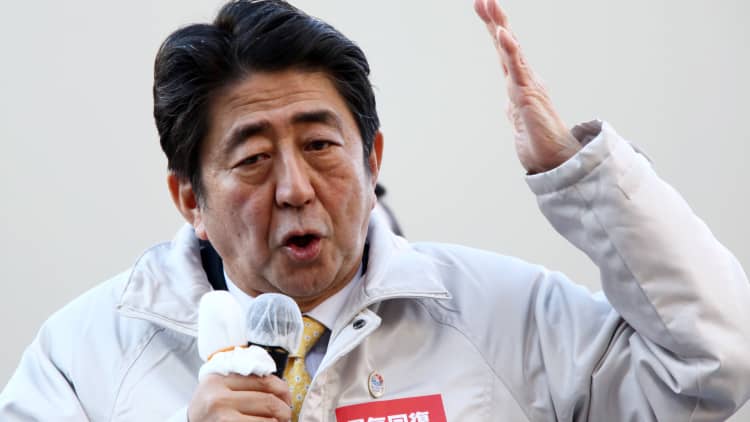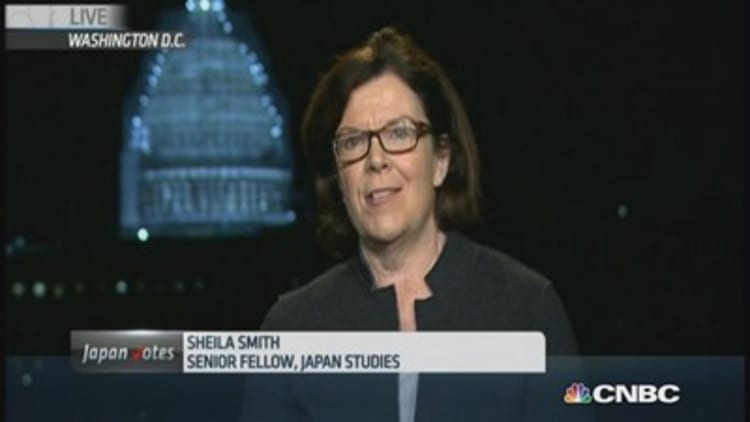
A tax-hike-induced recession has shaken confidence in Japanese Prime Minister Shinzo Abe's economic policies, but voters in one of Tokyo's poorest neighborhoods feel there's no option but to drink the Abe-flavored Kool-Aid as Sunday's elections approach.
The consumption tax hike "is really hurting," said Kiyoshi Hayashi, a storeowner in Tokyo's 14th district – one of the city's poorest. "There are fewer shoppers, and they are spending less. If you aren't rich, you're worse off."
"But there's no choice" other than Abe's Liberal Democratic Party (LDP), he said, highlighting a lack of alternatives as the Democratic Party of Japan (DPJ), the largest opposition party, remains weak.
Read MoreJapan bears bet on Abe victory followed by yen disaster
In November, Abe called the second election in two years after data showed the impact of a consumption sales tax hike to 8 percent from 5 percent in April tipped Japan into a recession. He delayed a second sales tax increase to 10 percent, initially scheduled for October 2015, by 18 months, calling Abenomics – the prime minister's effort to spur Japan's economy – into question.

The most recent opinion poll from the Mainichi newspaper showed that 70 percent of respondents don't think the prime minister's policies have made the economy any better, yet the ruling party looks set to win in a landslide on Sunday.
"Abe seems to be winning his cynical gamble by calling a premature and unnecessary snap election," said Koichi Nakano, professor of politics at Sophia University in Tokyo.
The trickle down promise
"The effects of Abenomics will trickle down to small and medium-sized businesses," the 14th district's sitting LDP candidate, Midori Matsushima, promised followers at a party supporters' rally on Wednesday. Around 20 percent of voters here are small business owners.
Local media is closely watching the race because, despite nationally leading the polls, the LDP incumbent – a former justice minister who resigned over allegations of violating election laws by distributing paper fans – is seen to be struggling to recover from the scandal.
Read MoreWhat recession? Japan Inc is on a roll
With the economy also working against Matsushima and the LDP, her supporters claimed that headline growth figures are misleading. One supporter that preferred to remain anonymous told CNBC, "The media is being too pessimistic. The economy will grow from next year."
Whether the numbers are debatable or not, local business owners are feeling the pinch.
"I think the consumption tax needed to be raised. But the economy is in a bad way," said Kaoru Ishikawa, a local business owner. Still, she said she feels there is no other alternative to the LDP.
Polls reinforce resignation
Since the election was called, opinion polls have consistently pointed to a convincing victory for Abe. The LDP is expected to hold around 300 seats out of the total 475, little changed from what it held before elections were called.
Following a local campaign stop by the opposition DPJ candidate Taketsuka Kimura, voters said they felt powerless to change the course of the elections: "I'm resigned the LDP will win," said Hayashi.
Disenchantment is so widespread that the 14th district's only other candidate, the Japanese Communist Party's (JCP) Kazuyuki Atou, told CNBC, "It's us or the LDP – we are the only alternative."
Read MoreJapan elections: 5 things you need to know
The JCP, with the campaign message "Stop the (Abenomics) rampage", is sweeping up the protest vote even outside this traditional bastion. Some polls suggest the JCP will double their number of seats to around twenty.
But regardless of the potential seat-holding changes in the lower house due to disenchantment with Abe and the LDP, little is expected to change on Sunday.
"The results seem predicable and unexciting," said Sophia University's Nakano.

